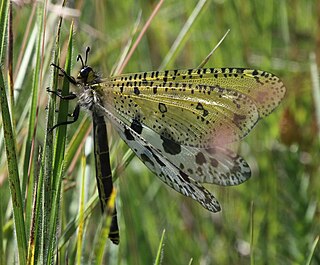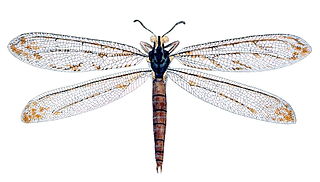
The antlions are a group of about 2,000 species of insect in the neuropteran family Myrmeleontidae. They are known for the predatory habits of their larvae, which mostly dig pits to trap passing ants or other prey. In North America, the larvae are sometimes referred to as doodlebugs because of the marks they leave in the sand. The adult insects are less well known due to their relatively short lifespans compared to the larvae. Adults, sometimes known as antlion lacewings, mostly fly at dusk or just after dark and may be mistakenly identified as dragonflies or damselflies.

Euroleon nostras is a species of antlion found over most of Europe. The scientific name can be translated as "our European [ant] lion". Adults resemble dragonflies or damselflies and may reach up to 30 mm (1.2 in) long, with a wingspan of 70 mm (2.8 in). The larvae prey on ants and other small creatures and require dry sandy soil in which to dig their pitfall traps.

Ascalaphidae is a family of insects in the order Neuroptera, commonly called owlflies; there are some 450 extant species. They are fast-flying crepuscular or diurnal predators of other flying insects, and have large bulging eyes and strongly knobbed antennae. The larvae are ambush predators; some of them make use of self-decoration camouflage.

The Neuropterida are a clade, sometimes placed at superorder level, of holometabolous insects with over 5,700 described species, containing the orders Neuroptera, Megaloptera, and Raphidioptera (snakeflies).

Myrmeleontiformia is an insect clade in the order Neuroptera, and which was historically treated as a suborder. The phylogeny of the Neuroptera has been explored using mitochondrial DNA sequences, and while issues remain for the order as a whole, such as "Hemerobiiformia" being paraphyletic, Myrmeleontiformia is generally agreed to be monophyletic, with one study giving the following cladogram:
Dendroleontinae is a subfamily of Myrmeleontidae, the antlions.

Palpares caffer is a species of antlions in the family Myrmeleontidae, which is native to southern Africa. It was described by Hermann Burmeister in 1839.
Glenurus luniger is a species of antlion in the family Myrmeleontidae. It is found in Central America and North America.

Glenurus is a genus of antlions in the family Myrmeleontidae and typical of the tribe Glenurini. There are about 12 described species in Glenurus.

Vella is a genus of antlions in the family Myrmeleontidae. There are about five described species in Vella.
Dendroleon speciosus is a species of antlion in the family Myrmeleontidae. It is found in North America.

Dendroleon is a genus of antlions in the family Myrmeleontidae. There are more than 20 described species in Dendroleon.

Dendroleon obsoletus, the spotted-winged antlion, is a species of antlion in the family Myrmeleontidae. It is found in North America.
Maula is a genus of antlions found in Africa, containing the single species, Maula stigmatus, described in 1912. This genus is classified in the tribe Palparini.
Froggattisca rennerensis is a species of cave-dwelling antlion, endemic to the Northern Territory.
Froggattisca anicis is a species of cave-dwelling antlion, endemic to the Northern Territory and Western Australia.
Froggattisca gemma is a species of cave-dwelling antlion, endemic to Queensland and Western Australia.
Froggattisca rieki is a species of cave-dwelling antlion, endemic to the Northern Territory and Western Australia.
Froggattisca radiostriata is a species of cave-dwelling antlion, endemic to Queensland and Western Australia.
Heoclisis fulva is a species of cave-dwelling antlion, found in Australia, in Queensland, Western Australia and the Northern Territory.











